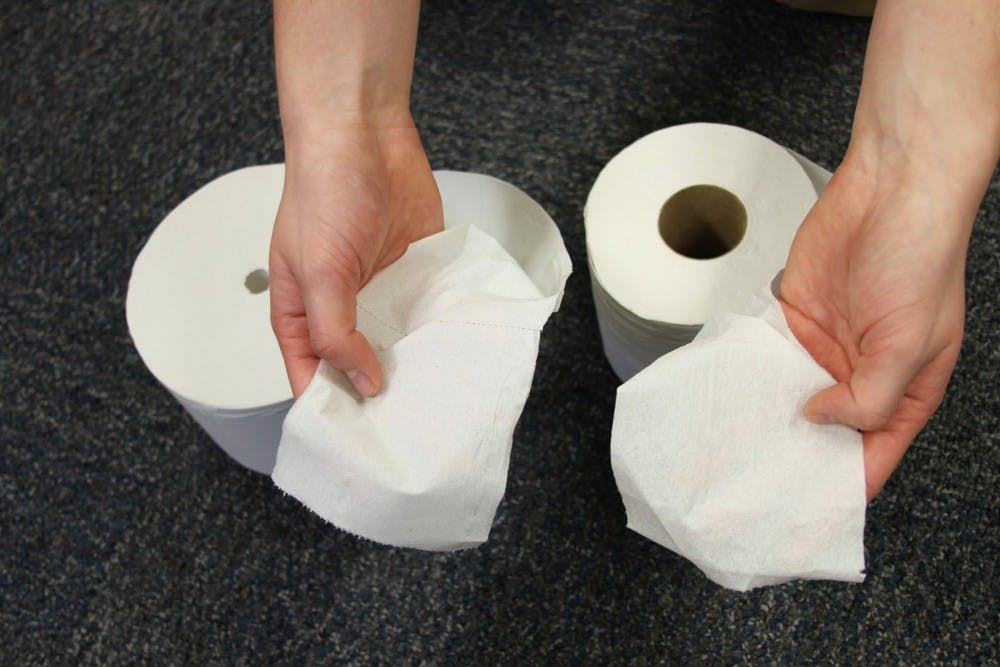Christine Menges |
The snappy campaign slogan became a reality this semester when ASUP President Julius Muwulya delivered on his promise to install “Two-ply and Wi-Fi” in the dorms.
Implementing two-ply toilet paper took several months because, according to Muwulya, the administration did not initially believe a humorous-sounding promise was a serious issue. Persistence was the key to solving this problem.
“I basically had to keep asking, keep knocking on their doors, almost every other week,” Muwulya said.
Eventually, the administration agreed to install better toilet paper in the residence halls.
According to Anthony Torres, a foreman with Physical Plant, the switch began two months ago, when administrators approached Andre Hutchinson, Physical Plant director, about how best to bring two-ply toilet paper to the dorms.
Torres and Hutchinson then sat down and looked at 30 different styles of toilet paper, before deciding on one they thought would fit both the students’ needs and the dispensers.
“We had planned on just putting the toilet paper in those dispensers, and call it good,” Torres said.
However, Torres said the toilet paper ended up being a little too big to fit the dispensers.
To correct the problem, Torres and other crew members replaced the old four-roll dispensers with new two-roll dispensers, a task they finished just before students returned for spring semester. These dispensers were small, leaving visible holes in the walls, but Physical Plant worked to eliminate the eyesore.
In terms of cost difference, the amount will be determined by overall usage.
“The exact numbers won’t be known until some time,” Torres said. “But it’s not that much of a difference.”
Josh Cleary, ASUP vice president, said initially complaints came from Corrado Hall that because the rolls were fewer, the despensers emptied faster, causing problems on weekends when housekeeping staff weren’t working.
However, he said that staff has worked to correct this problem. Cleary also said ASUP heard from residents in Shipstad Hall and Villa Maria Hall that they are satisfied with the new two-ply toilet paper.
Toilet paper quality is a political issue on other college campuses as well, with student councils at University of Texas, Austin, Texas Christian University and Princeton University all recently debating the issue.
Muwulya and Cleary got their campaign idea last academic year when Muwulya talked to students about what improvements they would like to see on campus.
“Every single person kept saying, ‘Oh, Wi-Fi sucks,’” Muwulya said.
One of Muwulya’s friends complained to him about the toilet paper, and Muwulya noticed that the toilet paper in Waldschmidt Hall was two-ply, while the dorms and other buildings on campus were lower quality.
Muwulya and his running mate Cleary discussed how they could form a simple concept that would be relevant and interesting to students, and one that could be easily presented to the administration.
“The simple answer was: ‘Two-ply and Wi-fi,’” Muwulya said.
UP’s Information Services department had begun to improve campus Wi-Fi last academic year, before Muwulya presented his Wi-Fi idea. Between spring break of last year and the beginning of fall semester, they were able to triple the bandwidth.
According to Muwulya, IT accomplished this goal by putting more access points on campus. They also put two big antennas on top of Buckley Center for Wi-Fi access in the Academic Quad.
Some students say the Wi-Fi is just as bad as before. But that might be caused by factors outside of ASUP’s control, such as a high number of students trying to connect to the Internet simultaneously.
“The Wi-Fi has improved, but they bottleneck it at certain times, and it makes doing assignments kind of rough,” sophomore Scotty Hearron said.
Muwulya said he is open to suggestions for improvement. Aside from better Wi-Fi and toilet paper, Muwulya believes his campaign has accomplished something else.
“Once students kind of see that we came in with this funny campaign and were able to get elected and follow through,” he said. “They were able to trust us more.”
Christine Menges is a reporter for The Beacon. You can reach her at Menges15@up.edu or on Twitter @ChristineyBird.








